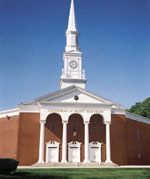
 |
|
|
|
|
|
|
|
 |
What Are We Doing in Liturgy?The word liturgy means the prescribed form for a public religious service, the ritual patterns that a church uses. It comes from a Greek word meaning "work," so liturgy is the work of the people when they gather. The texts for the liturgical work done by an Episcopal Church are found in a book called The Book of Common Prayer. Its roots are in the Church of England, but the prayers go back much further to the beginnings of Christianity. We use scripture from the Bible as part of every worship service. As you read the prayer book, you will find services and prayers for every sort of occasion.Many congregations have a pattern of worship that is less formal and more spontaneous. If you have been in such a service, you may have appreciated and enjoyed the freedom and spiritual quality of this less structured form of corporate worship. The traditional Episcopal liturgy, on the other hand, is more structured. It provides the worshiper with a link to the great prayers of the past, prayed by millions of believers who came before us, and written in a literary style that calls forth our highest feelings. It also enables the worshiper to use his or her body in a worshipful way through kneeling, bowing, making the sign of the cross, eating, drinking, standing, speaking together, and carrying the light of candles and scripture in procession to the altar. Liturgy has the power to bring us to a place where we can hear God in the depths of our being. The service has two main parts: the service of the Word and the Holy Eucharist. The service of the Word focuses on Bible readings and comments about those readings. The second part, the Holy Eucharist, is the central event in Episcopal worship. Think of it as a meal to which you have been invited. Don't worry if your mind strays from time to time. The pattern of the service will "pick you up" in a few moments. The liturgy is there to "hold" you while you rest in God and respond to God. Enjoy! |

Our Patient Merciful God
The Bible and the Gospel speak of God's great mercy for us ...
(Click title to read more)

|
|
| Home | Cathedral History | Seed Faith Principle | Explain Seed Faith | Developing Strong Faith | Prayer Request Letters | Teaching Prayer | | Faith Contact Item | Prayer Rug | Seed Faith Growth | Kneeling in Worship | Site Map |
“Enter his gates with
thanksgiving and his courts with praise; give thanks to him
and praise his name. |
||